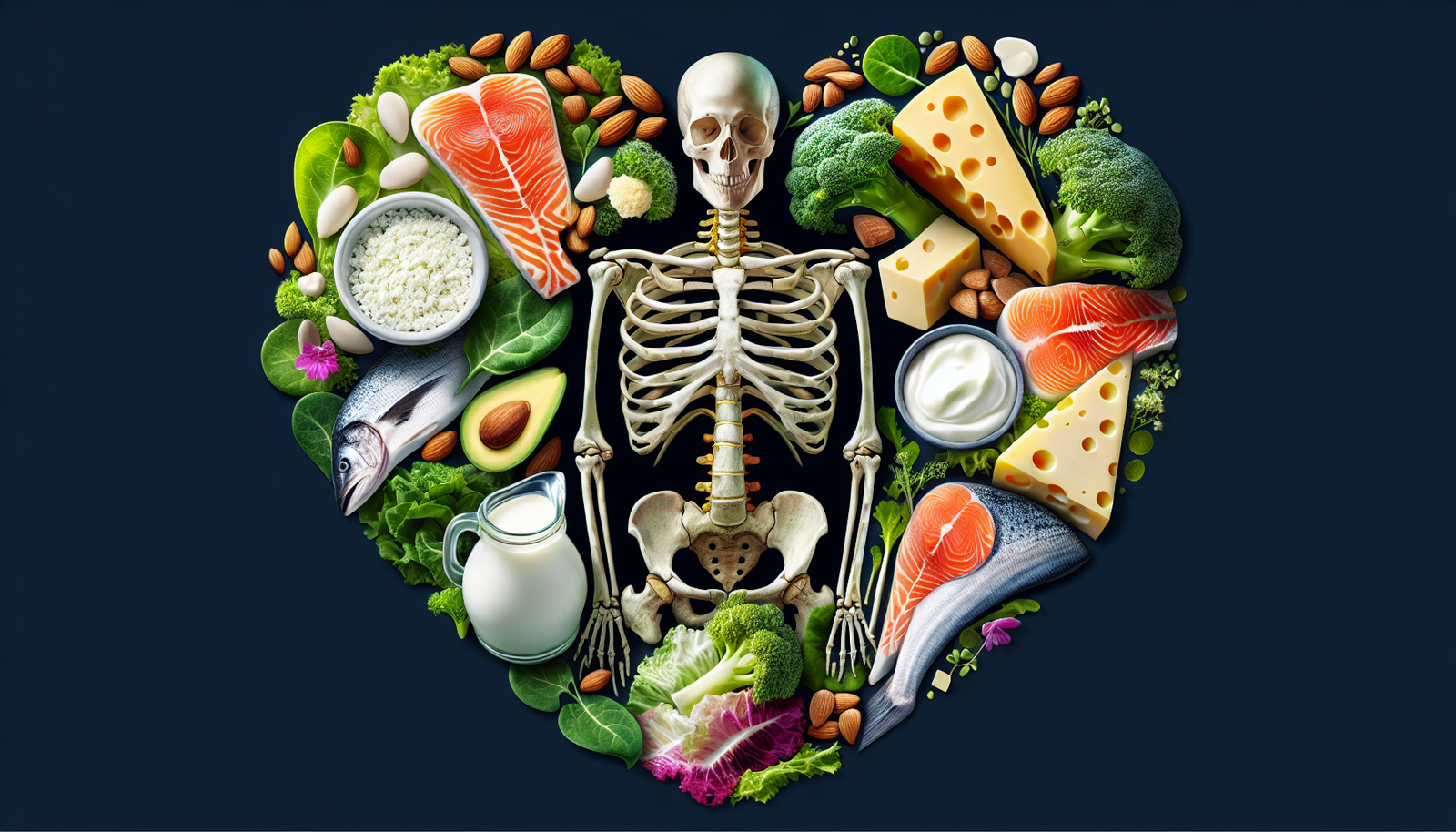
The Importance of Calcium for Bone Health and How to Get Enough
Calcium is crucial for bone health, playing a vital role in maintaining strong and durable bones. An intriguing fact is that over 99% of the body’s calcium is stored in bones and teeth, underscoring its importance. This post will explore the significance of calcium in bone health, how to ensure an adequate intake, and the consequences of deficiency. With bone-related issues affecting millions worldwide, understanding how to support bone strength is essential. Readers will gain insights into the best dietary sources of calcium and recommended supplementation strategies to promote lifelong bone wellness.
Understanding the Role of Calcium in Bone Health
Calcium is not just an essential mineral; it’s a fundamental building block for our bones. With every step we take and every move we make, calcium is working behind the scenes to support and maintain our bone health. Let’s dive into how calcium functions to build and sustain strong bones.
How Calcium Supports Bone Density and Structure
Calcium plays a crucial role in maintaining bone density. It provides the necessary rigidity and strength to our bone structure. The mineral forms a large part of the bone matrix, a framework that gives bones their shape and protects organs from injury. When calcium levels are adequate, bones remain dense and less prone to fractures.
Osteoblasts, specialized bone cells, utilize calcium to form new bone. This process is vital during growth phases and for healing fractures. Consistent calcium intake ensures that bone turnover remains balanced, preventing conditions like osteoporosis. A lack of calcium can lead to decreased bone mass, increasing the risk of fractures.
The Biological Process of Bone Mineralization
Bone mineralization is a fascinating process where calcium and other minerals deposit in the bone tissue. This deposition transforms the softer cartilage into hard bone, crucial during growth and for maintaining bone health in adults. The process begins with the secretion of osteoid, a collagen-rich matrix, by osteoblasts.
Calcium ions then attach to this matrix, along with phosphate, forming calcium phosphate crystals. These crystals harden, establishing the bone’s strength. The efficiency of mineralization depends significantly on the availability of calcium and vitamin D, which enhances calcium absorption in the intestines.
Calcium’s Interactions with Other Minerals for Optimal Bone Health
For calcium to adequately perform its role, it must interact with other minerals like magnesium, phosphorus, and vitamin D. Magnesium helps convert vitamin D into its active form, which is crucial for calcium absorption. Phosphorus works alongside calcium to form strong bones and teeth.
An imbalance in these minerals can affect bone health. For instance, too much phosphorus can interfere with calcium metabolism, leading to bone loss. Therefore, it’s essential to maintain a balanced intake of these nutrients to ensure optimal bone health.
Recommended Dietary Intake of Calcium for Different Age Groups
Everyone needs calcium, but our requirements change as we age. From infants to the elderly, the amount of calcium we need varies to match our stage of life and physiological demands. Here’s a detailed look at how calcium intake should be adjusted for different ages and life stages.
Calcium Needs During Childhood and Adolescence
Children and adolescents are in a critical growth phase, requiring ample calcium to support the rapid development of their bones. During childhood, the bones are growing in size and density, which sets the foundation for future skeletal health.
The recommended daily intake for children aged 1-3 years is around 700 mg. As they grow, ages 4-8 need about 1,000 mg daily. During adolescence (ages 9-18), the requirement peaks at 1,300 mg daily, a reflection of the growth spurts and bone development in this age group.
Calcium Recommendations for Adults and Older Adults
In adulthood, maintaining bone health continues to be important, though the focus shifts towards preserving bone mass and preventing bone loss. The recommended daily calcium intake for adults aged 19 to 50 is approximately 1,000 mg. For women over 50 and men over 70, this increases to 1,200 mg daily due to the higher risk of osteoporosis.
Adults should focus on a balanced diet that includes calcium-rich foods and, if necessary, supplements to meet these recommendations and support ongoing bone health.
Adjusting Calcium Intake for Pregnant and Lactating Women
Pregnancy and lactation introduce unique nutritional needs, including increased calcium intake. During these periods, a woman’s body provides calcium to support the developing fetus and produce milk.
While the recommended daily intake remains similar to other adults (1,000 mg), some healthcare providers may suggest increased calcium to ensure both the mother and child meet their needs. Adequate calcium intake helps protect the mother’s bone density and supports the baby’s skeletal development.
Sources of Calcium and Tips for Maximizing Absorption
Getting enough calcium is crucial, but it’s equally important to know where to find it and how to ensure your body absorbs it efficiently. Let’s explore the various sources of calcium and methods to enhance its absorption for optimal bone health.
Natural Food Sources Rich in Calcium
Calcium-rich foods are abundant and varied, making it easy to incorporate them into your diet. Dairy products like milk, cheese, and yogurt are well-known sources. However, there are plenty of non-dairy options as well.
- Leafy greens such as kale and broccoli
- Fortified plant-based milk like almond or soy milk
- Canned fish with bones, like sardines and salmon
- Nuts and seeds, especially almonds and chia seeds
Calcium Supplements: Types, Efficacy, and Considerations
When dietary sources are insufficient, supplements can help meet calcium needs. There are several types of calcium supplements, including calcium carbonate and calcium citrate.
- Calcium Carbonate: Requires stomach acid for absorption, best taken with food.
- Calcium Citrate: Easier to absorb, can be taken with or without food.
Before starting supplements, consider factors like age, dietary preferences, and existing medical conditions. Consulting with a healthcare provider can help determine the appropriate supplement type and dosage.
Factors Affecting Calcium Absorption and How to Improve It
Several factors influence how well your body absorbs calcium. One major factor is vitamin D, critical for calcium absorption in the intestines. Sunlight exposure and foods like fatty fish can help maintain adequate vitamin D levels.
Other factors include the presence of oxalates and phytates in certain foods, which can bind calcium and reduce absorption. Cooking these foods can help reduce their oxalate content. Timing is also crucial; spreading calcium intake throughout the day can enhance absorption. Avoiding excessive caffeine and alcohol intake can also benefit calcium absorption.
Conclusion
Calcium is essential for maintaining bone health and preventing osteoporosis. It helps build and maintain strong bones throughout a person’s life. Adequate calcium intake is critical during childhood and adolescence when bone development is at its peak. Dairy products, leafy greens, and fortified foods are excellent calcium sources. Vitamin D is also important as it aids calcium absorption in the body.
FAQ
How does calcium contribute to bone health?
Calcium plays a critical role in forming and maintaining strong bones. It is a key component of bone tissue, helping to ensure structural integrity and density. Regular calcium intake supports bone regeneration and reduces the risk of fractures.
What are the best dietary sources of calcium for strong bones?
Dairy products like milk, cheese, and yogurt are excellent calcium sources. Leafy greens such as kale and spinach, along with fortified foods like cereals and plant-based milk, also provide significant amounts. Fish with edible bones, like sardines and salmon, add calcium to the diet as well.
How much calcium do I need daily for optimal bone health?
Adults generally need around 1,000 to 1,200 milligrams of calcium daily. Specific needs may vary based on age, gender, and life stage. Consulting with a healthcare provider can help determine the right amount for individual needs.
Can calcium supplements improve bone density?
Calcium supplements can aid in maintaining bone density, especially for those unable to meet their needs through diet alone. However, it’s essential to combine supplementation with vitamin D for better absorption and consult healthcare providers before starting any regimen.
What are the risks of calcium deficiency for bone health?
A lack of calcium can lead to weakened bones and increase the risk of conditions such as osteoporosis and fractures. Over time, deficiency may also cause muscle cramps and dental problems.
How does calcium absorption affect overall bone health?
Effective calcium absorption is vital for bone health. Factors like vitamin D levels, age, and certain medications can influence how well the body absorbs calcium. Ensuring enough vitamin D and monitoring dietary habits can enhance calcium uptake.











